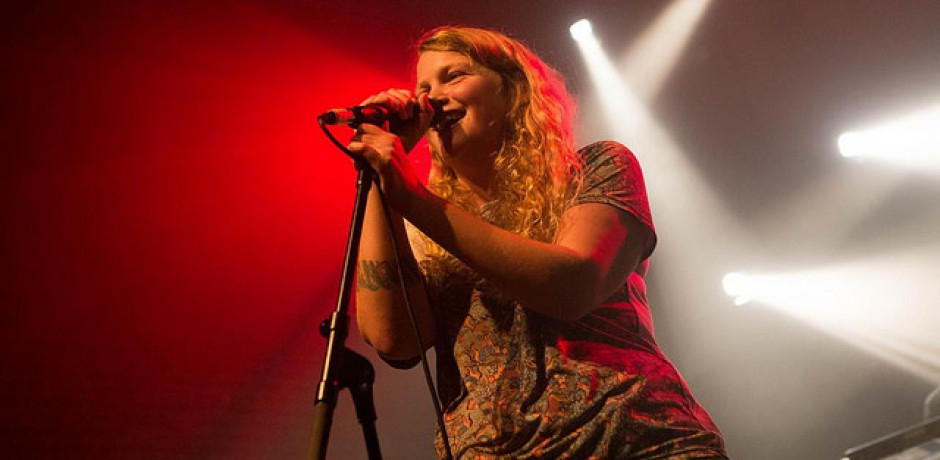Kate Tempest in conversation with Dave Haslam, HOME, April 17 2016
Something feels a little bit special before the event even gets going. There’s a buzz in the room. You look around as Kate Tempest’s Everybody Down plays through the speakers and you see that the audience is made up of an interesting mixture of people, everyone from tweens to pensioners. All of them on the edge of their seats. And you’re not even there for one of her critically acclaimed gigs, or her powerful performance poetry. No, this Sunday night at HOME is just part of a book tour for her debut novel. She might read a little bit from the book, but in the main part she’ll just be sitting on stage and chatting to Dave Haslam. That’s all. But it doesn’t matter, because this is Kate Tempest. And as humble and heart-warming as she will prove to be throughout the evening, you know that something special will happen once she takes her seat.
And so it proves. Once the welcoming cheers finally calm down, Kate launches into a reading of the novel’s prologue. Beginning with a prose poem that bemoans the state of living for today’s London youth, while also offering hope in the despair, you are treated to a glimpse of the unique performance style that has made Kate such a superstar. You can’t help but be impressed. This is as good a novel opening as you’ve heard in a long time, and there is no one who could be reading it with more style.
Kate beams during the early part of the interview. Asked about the characters that have been central to her early plays, her poetry, her Mercury nominated album, and now, The Bricks that Built the Houses, she discusses how they have taken over her world in the last few years. How her ‘imaginary friends’ have become as important to her as anyone. When she tells you she loves ‘Becky’ and ‘Pete’ you believe her, and it easy to picture it when she tells you how she sat at the back of her tour bus to write these characters into beautiful life. When talking of her love for writing, her passion for music, and her obsession with language, Kate is perhaps the most enlightening speaker you remember listening to. She makes the most mundane observation sound like a song.
You do observe, though, that she feels a little less comfortable when the questions veer away from her work. Somehow this 30-year-old woman has come to be seen as the ‘voice of her generation’. Because she raps and writes about people that many others ignore, the young people on the fringes of society, she is now seen as their spokesperson. That was never her aim. While wanting to show that these people’s lives are far from two dimensional and that many of the stereotypes don’t apply, she wasn’t intending to be their leader. But in some ways that is what she has become. You can’t help but feel a little bit of sympathy for her as she discusses this subject, particularly when Haslam seems to encourage her to take up the mantel. But she deals with the topic with the humour and humility that has come to define her, and you can’t help but warm to her even further.
More mildly uncomfortable questions come from the audience. No other rapper/writer would be asked whether they think the destruction of the planet is inevitable, or if they think there is life after capitalism, but Kate is. She squirms a little. You shake your head. Kate is a masterful writer, not a politician, and she is most invigorating when discussing her craft. They shouldn’t be asking her those questions. But they do. And once again, you can only sit there in admiration as she spits out answers which are as eloquent as any you’ve heard from her during the evening.
Leaving the event, you are once again reminded of Kate’s massive popularity. The queue for the book signing is so long that, despite clutching her novel in your hand, you decide to head straight to the pub. Kate has said so many impressive things in the last hour and ten minutes that you are desperate to discuss them. You get a pint and then you reminisce about the writing advice she gave, smile at her obvious passion for the characters she’s created, marvel at her understanding of the relationship between writers, their texts, and their readers, and wish that, for even a minute or two, you had the ability to read your work on stage with the same skill as she does. You shake your head again. Kate might be uncomfortable with the idea of being the voice of a generation, and you sympathise with that. But you know that if she keeps writing and producing work as good as what has come so far, she might just be the most important artist of her generation. Whether she likes it or not.
Fran Slater

